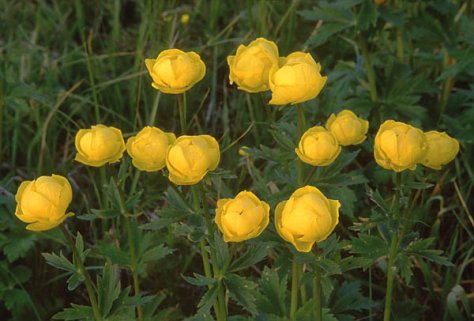Week 19, 10.05.– 16.05.2010, at Jõgeva
Text: Laine and Vello Keppart
Photo: Arne Ader
Translation: Liis
Globeflowers.
During the week the weather turned properly warm. On Monday the air temperature in Jõgeva only reached 8 degrees as a maximum and on Tuesday morning there was a strong frost on the ground, but in the second half of the week it was warm as in the middle of summer – during daytime the air temperature rose to 23-27 degrees and even at night there were more than 10 degrees of warmth. With the high temperatures evaporation became more intense and towards evening rain clouds formed. Thunder was heard all around, thundery rain fell on Thursday and Sunday. The rainfall on Sunday was quite heavy at Jõgeva and flooded gardening lands, particularly in the western parts of the town. The water didn’t remain long on the surface however but seeped quickly into the soil.
The summery warmth brought along fast development in nature. During the week most trees leafed, even the oaks, always late to come into leaf. Only the ashes didn’t get their leaves out yet, but they flowered during the week.
The first among bushes to start flowering were the alpine currants and gooseberries, from Friday also blackcurrants and redcurrants, and the bird cherries, that were 3-4 days earlier than their average flowering time over 45 years in Jõgeva. On Saturday grasslands turned yellow with dandelion flowers, flower beds in gardens red from early tulips. Myrobalan or cherry plums (Prunus cerasifera) flowered, from Sunday night also cherries, several plum varieties and pears. Flower buds showed on apple trees, but they didn’t open this week. On Sunday spruce cones released pollen, in the meadows the first globeflowers flowered. Of weeds the rockets (Barbarea) and shepherd’s purse (Capsella) started flowering. The colts-foot plants already spread their seeds, but at the same time there were still flowers to be seen.
Of the field crops, winter rape began flowering at the end of the week, late clover had grown 15-16 cm tall, winter rye showed its stem node above ground, winter wheat is at the beginning of this development stage, the sowings of summer cereals have sprouted. Mass invasions of flea beetles (Phyllotreta) and greenflies (aphids) have started and control measures are applied in the fields.
Of migrant birds warblers, flycatchers, wheatears, whinchats, rosefinches, the icterine warbler and the swift arrived this week. Thrushes and starlings have hatched their young.
Besides the gnats swarms of irritating mosquitoes apppeared.
Jõgeva, 17.05.2010.









